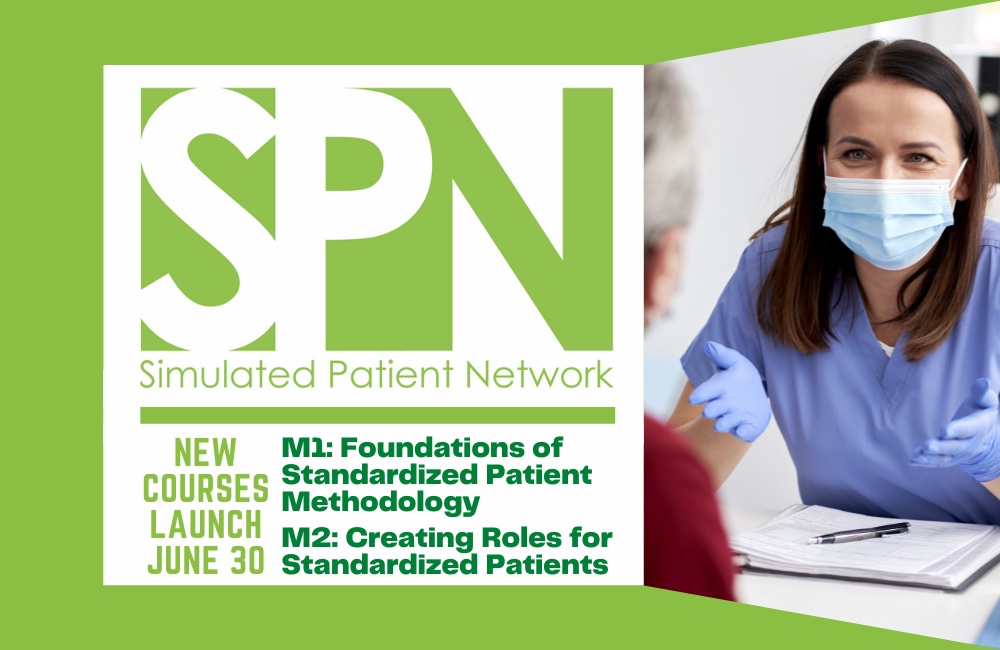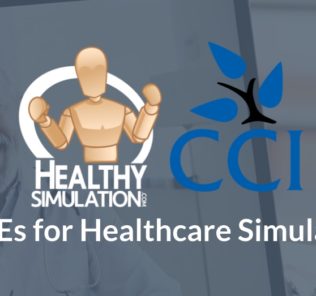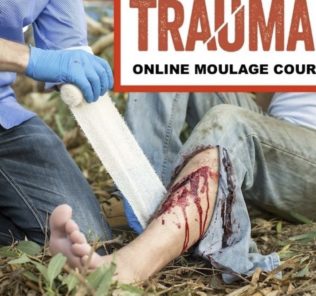New to Educating with Standardized Patients? Join Tomorrow’s Free Webinar & June-Only SPN Course Launch!
Pulling from the upcoming launch of the Simulated Patient Network’s (SPN) limited-time instant-access online Standardized Patient CE courses, this 1-hour open access webinar introduces the concept of Standardized Patient, aka Simulated Patient, methodology. This free webinar by Debra Nestel PhD, FAcadMed FSSH, Professor of Simulation Education in Healthcare at Monash University and Editor-in-Chief, BMJ Simulation and Technology Enhanced Learning (STEL), covers key terms, brief history of Standardized Patient (SP) methodology, considers the scope of practice of SPs and their unique features. The presenters also outline standards associated with SP methodology and share some of our favorite SP methodology resources. As well, this free webinar also introduces approaches to creating roles for SPs.
Open Access Webinar: June 15th, 6AM PT, 9AM ET, UTC-7: Introduction to Educating with Standardized Patients
Online RN CE Courses: Early-Bird Registration Ends June 22nd, Standard Registration Ends June 30th:
SPN M1 (5 CEs): Foundations of Standardized Patient Methodology
SPN M2 (3 CEs): Creating Roles for Standardized Patients
Sponsored Content:
About the Simulated Patient Network (SPN) Standardized Patient Courses
The SPN offers a range of courses for individuals working with Simulated Patients (SPs), aka Standardized Patients. The courses are likely to be of interest to simulation educators, technicians, SPs and to some extent learners involved in undergraduate and postgraduate training in all health professional disciplines. All courses are designed to take three hours expect for the foundational program which takes five hours.
Module 1 introduces the concept of SP methodology. It covers key terms, brief history of SP methodology, considers the scope of practice of SPs and their unique features. The instructors also outline standards associated with SP methodology and share some of their favorite SP methodology resources. This limited-time-only online course by the Simulated Patient Network introduces the concept of Standardized Patient (aka Simulated Patient or SP) methodology. After covering key terms and SPs’ scope of practice, it considers the who, what, why and how of the method and acknowledges its origins. You’re introduced to a wide range of resources with core and extension work by experts in the field. Throughout the course, you’re encouraged to make meaning of the content for your own setting.
Module 2 introduces approaches to creating roles for Standardised Patients. There is no one right way to do this. However, some approaches seem better suited to some contexts than others. Templates are valuable for documenting roles. They prompt the authors for specific and usually critical information. The instructors share approaches and templates. Overall, Module 2 introduces approaches to writing SP roles. This task is fundamental to SP work – usually a text document (sometimes with audiovisual supplements), the written SP role provides guidance to the SP about their character, the purpose of the scenario, their health issue (or other relevant information). You’re introduced to a wide range of resources with core and extension work. Throughout the course, you’re encouraged to make meaning of the content for your own setting.
Sponsored Content:
Bundle During Early-Bird Registration for Almost $125 Off!
Take advantage of the early-bird registration (which ends next Tuesday, June 22nd) for huge savings on the standard price, or secure BOTH modules 1 and 2 for even great savings — almost $125 off the individual courses! Register for M1 and M2 to cover both topics at a discounted rate, or skip the introduction and start creating roles for SPs today with just module 2!
What People Are Saying About the Online SPN SP Courses, Now Coming to HealthySimulation.com:
“I thought I knew what SPs did but this course has helped me understand the fundamentals and also the values that underpin the methodology. I’m a bit shocked by some of my own practices. I just didn’t see the impact of some of the things I’ve been doing for years. I feel confident that I’m on the right track now. Amazing.”
“My work gave me time to do the course. Otherwise, I don’t think I would have done it now that I have, I don’t know what I was thinking. It’s transformed my approach to SP’s – now I work with them rather than use them. Just by changing a couple of words, it changes the power in our relationship. It’s helped me to see our work differently.”
“The authors are really experienced and it shows – they’ve obviously been doing this for a long time and they’ve selected important content to share. They also cut out what doesn’t align with their values. It was a fresh look at SP work.”
“The best thing about this course is that I can work through it at my own pace, it’s logical. You can see how the ideas build. And the access to resources is great. Actually, they’re fantastic. I’ve now drafted my first SP role.”
“I’m an OSCE examiner and I’ve always wondered who wrote the SP roles or the stations. This course has made it really clear to me who should write them and how. I just never thought about getting patients and SPS involved with clinicians. It’s obvious now.”
About the SPN Course Instructors
Debra Nestel PhD, FAcadMed FSSH is Professor of Simulation Education in Healthcare, Monash University, and Professor of Surgical Education, Department of Surgery, University of Melbourne, Australia. Debra is Editor-in-Chief, BMJ Simulation and Technology Enhanced Learning (STEL), the journal of the Association for Simulation Practice in Healthcare (ASPiH). She is program lead for the Master of Surgical Education (Department of Surgery, University of Melbourne and Royal Australasian College of Surgeons) and Master of Surgical Science (University of Melbourne) and Graduate Certificate in Clinical Simulation (Monash University). Debra leads a national faculty development program for simulation practitioners – NHET-Sim and a virtual network in Simulated Patient Methodology. She has received national awards for her work in healthcare simulation (Ray Page Award for service to the simulation community, Simulation Australasia and a Program Innovation Award, Australian Government) and a Presidential Citation from the Society for Simulation in Healthcare (SSH). She has held many positions in professional associations across her career. Mainly a qualitative researcher, Debra has published over 200 peer-reviewed papers in health professions education, edited books on simulated patient methodology (2015), healthcare simulation (2017), surgical education (2019) and research methods for healthcare simulation (2019).
Cathy Smith PhD, MA, BA(Hons), CHSE is an Interprofessional and Simulation Educator in the Division of Training and Simulation at Baycrest, a geriatric health system located in Toronto, Canada. In addition, she consults with various educational and assessment organizations locally, nationally, and internationally. She works with learners at all stages and has developed curriculum for diverse formats, ranging from face-to-face to web-based platforms. Recognition for her work includes: the Ruedy Award (Canadian Association of Faculties of Medicine) for innovation in medical education; the Blizzard Award (Canadian Society for Teaching and Learning in Higher Education) for outstanding teaching; the Association of Standardized Patient Educators (ASPE) Outstanding Educator Award; and the SIMone Simulation Citizen of the Year Award. A long time ASPE member, she is the current chair of the International Committee.
Jennifer Harlim PhD MBA BA(Hons) completed her PhD studies at the Royal Melbourne Institute of Technology (RMIT), Australia. Her post-graduate research was in the area of engineering education and professional development focusing on problem solving. Prior to and during her PhD studies, Jennifer was actively involved in a number of educational-based projects. After completing her research studies in 2013, she worked with a team of researchers and educators at the School of Health Sciences, RMIT University. Her knowledge of educational theories and prior experience on working in educational projects contributed to the last stage of the project where the 3-D simulation game, Second Life was utilised for the training of healthcare students.
Join the SPN Webinar Tomorrow to Learn More!
Lance Baily, BA, EMT-B, is the Founder / CEO of HealthySimulation.com, which he started in 2010 while serving as the Director of the Nevada System of Higher Education’s Clinical Simulation Center of Las Vegas. Lance also founded SimGHOSTS.org, the world’s only non-profit organization dedicated to supporting professionals operating healthcare simulation technologies. His co-edited Book: “Comprehensive Healthcare Simulation: Operations, Technology, and Innovative Practice” is cited as a key source for professional certification in the industry. Lance’s background also includes serving as a Simulation Technology Specialist for the LA Community College District, EMS fire fighting, Hollywood movie production, rescue diving, and global travel. He and his wife live with their two brilliant daughters and one crazy dachshund in Las Vegas, Nevada.
Sponsored Content:


















